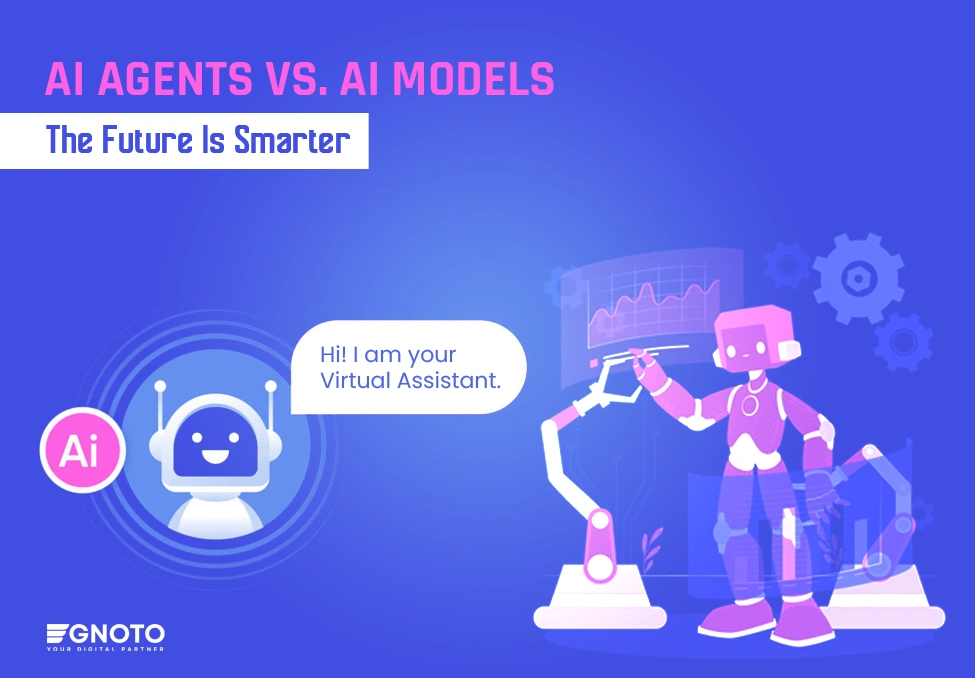AI can handle repetitive tasks, help you generate new ideas, handle business remotely, increase visibility of your business globally, and quickly, without needing much human interaction. But AI is a broader term; it’s a technology that is used to develop different tools, software, apps, and more. It is used to train models and agents that are later called AI models and AI agents. Many people think both are the same and can be used interchangeably.
Businesses also get confused when it comes to choosing one. That’s why understanding the difference between AI agents and AI models is crucial. It helps to choose the right tool as per need without getting confused. You can explore the difference between these platforms and decide which one is the best for your business.
What Are AI Models?
AI models are also called machine learning and deep learning models because these technologies are used to develop AI models. They are designed to process data and generate insights as per the task. These models need an ample amount of data for training. It helps them learn patterns, keywords, and respond as per the prompt. An AI model helps you with language translation, image recognition, or predictive analytics.
Initially, ChatGPT was an AI model. Now it has been upgraded and includes many other features. It also allows integration of different tools. So, now it’s an AI model plus an AI agent.
What Are AI Agents?
AI agents take the power of artificial intelligence one step further. They can not only assist you, but also work for you. For example, you can create 50 social post ideas with an AI tool and post them with the help of the same tool. So, they can make decisions and take actions without human intervention.
They interact with the environment, learn from interaction, and adapt their behavior to achieve specific goals. Developers do not have to code to update AI agents for new tasks every time. Think of an AI-powered virtual assistant that schedules meetings, sends reminders, and manages emails based on your preferences.
Difference Between AI Models and AI Agents
An AI model is like a smart brain that thinks for you and provides you with ideas. So your task remains to implement them. It takes input, processes it, and gives an output, but it doesn’t take any real action on its own.
For example, when you ask an AI model, “What’s the weather in Dubai now?” It might answer like this. “I can’t check real-time weather because I don’t have browsing access.” It happens when the model is not designed to fetch real-time weather data. It can be upgraded later.
On the other hand, an AI agent is like a smart assistant with tools. It is designed keeping a specific goal in mind. For example, Leonardo.ai is an AI agent because it is designed specifically to generate images. You can edit the image per your needs with prompts and tools available on the platform. Well, it doesn’t think on its own, which AI agents generally do, but it does a specific task. Generating images is the main and only purpose of this tool.
Here is a table for better understanding:
| Feature | AI Model | AI Agent |
|---|---|---|
| Can it act? | No | Yes |
| Needs tools or APIs | No | Often uses tools |
| Role | Thinks and responds | Thinks, decides, and acts |
| Example | ChatGPT without tools | ChatGPT with browsing, memory, and plugins |
How to Decide Which Is the Best for Your Business?
AI models and agents have many features. They can help your business in various ways. But before you start using both, think for a moment. It can be overwhelming to use both.
Opt for AI Models if:
- Your primary need is data analysis and prediction to increase conversions.
- Tasks are well-defined and do not require real-time decision-making.
- You have structured data and clear objectives about your business.
Opt for AI Agents if:
- Your business requires real-time decisions and to handle specific tasks.
- You have to handle complex and multi-step tasks that take a lot of time.
- You want to personalize customer interaction for effective and consistent growth of the business.
Moreover, understand the tool’s features and check whether it aligns with your requirements. It could be difficult to decide which is the best without using it. You can use it once and decide whether it fits your business objectives.
What Can You Expect in the Future?
We all know that AI technology is at its initial stage, which means it has a lot of potential to do much more. It will continue to grow and evolve in the future. The integration of AI agents into business processes is expected to become more prevalent. Companies like Salesforce are already leveraging AI agents to enhance customer service, with 84% of customer service queries now resolved by AI agents.
However, it’s essential to recognize that AI models and AI agents are not mutually exclusive. In many cases, AI agents incorporate AI models to analyze data and inform their decisions. Therefore, a hybrid approach, utilizing both AI models and AI agents, may offer the best solution for businesses seeking to harness the full potential of AI.
Conclusion:
AI models and AI agents help you save your time and resources to organize operations and run your business efficiently. But not all businesses have the same ways of operating, so their methods and strategies vary. It affects the choice of tools. So, understand what your business needs: an AI model or an AI agent. Many AI models also have features of AI agents, but they can be expensive. Go through this blog one more time, assess which tool can best align with your goals, and help to overcome drawbacks in the business with automation.










